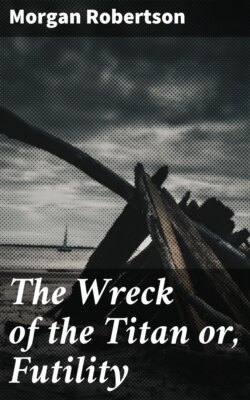Читать книгу The Wreck of the Titan or, Futility - Morgan Robertson - Страница 8
На сайте Литреса книга снята с продажи.
CHAPTER V
ОглавлениеTable of Contents
An incident occurred that morning which drew Rowland's thoughts far from the happenings of the night. A few hours of bright sunshine had brought the passengers on deck like bees from a hive, and the two broad promenades resembled, in color and life, the streets of a city. The watch was busy at the inevitable scrubbing, and Rowland, with a swab and bucket, was cleaning the white paint on the starboard taffrail, screened from view by the after deck-house, which shut off a narrow space at the stern. A little girl ran into the inclosure, laughing and screaming, and clung to his legs, while she jumped up and down in an overflow of spirits.
"I wunned 'way," she said; "I wunned 'way from mamma."
Drying his wet hands on his trousers, Rowland lifted the tot and said, tenderly: "Well, little one, you must run back to mamma. You're in bad company." The innocent eyes smiled into his own, and then—a foolish proceeding, which only bachelors are guilty of—he held her above the rail in jesting menace. "Shall I drop you over to the fishes, baby?" he asked, while his features softened to an unwonted smile. The child gave a little scream of fright, and at that instant a young woman appeared around the corner. She sprang toward Rowland like a tigress, snatched the child, stared at him for a moment with dilated eyes, and then disappeared, leaving him limp and nerveless, breathing hard.
"It is her child," he groaned. "That was the mother-look. She is married—married." He resumed his work, with a face as near the color of the paint he was scrubbing as the tanned skin of a sailor may become.
Ten minutes later, the captain, in his office, was listening to a complaint from a very excited man and woman.
"And you say, colonel," said the captain, "that this man Rowland is an old enemy?"
"He is—or was once—a rejected admirer of Mrs. Selfridge. That is all I know of him—except that he has hinted at revenge. My wife is certain of what she saw, and I think the man should be confined."
"Why, captain," said the woman, vehemently, as she hugged her child, "you should have seen him; he was just about to drop Myra over as I seized her—and he had such a frightful leer on his face, too. Oh, it was hideous. I shall not sleep another wink in this ship—I know."
"I beg you will give yourself no uneasiness, madam," said the captain, gravely. "I have already learned something of his antecedents—that he is a disgraced and broken-down naval officer; but, as he has sailed three voyages with us, I had credited his willingness to work before-the-mast to his craving for liquor, which he could not satisfy without money. However—as you think—he may be following you. Was he able to learn of your movements—that you were to take passage in this ship?"
"Why not?" exclaimed the husband; "he must know some of Mrs. Selfridge's friends."
"Yes, yes," she said, eagerly; "I have heard him spoken of, several times."
"Then it is clear," said the captain. "If you will agree, madam, to testify against him in the English courts, I will immediately put him in irons for attempted murder."
"Oh, do, captain," she exclaimed. "I cannot feel safe while he is at liberty. Of course I will testify."
"Whatever you do, captain," said the husband, savagely, "rest assured that I shall put a bullet through his head if he meddles with me or mine again. Then you can put me in irons."
"I will see that he is attended to, colonel," replied the captain as he bowed them out of his office.
But, as a murder charge is not always the best way to discredit a man; and as the captain did not believe that the man who had defied him would murder a child; and as the charge would be difficult to prove in any case, and would cause him much trouble and annoyance, he did not order the arrest of John Rowland, but merely directed that, for the time, he should be kept at work by day in the 'tween-deck, out of sight of the passengers.
Rowland, surprised at his sudden transfer from the disagreeable scrubbing to a "soldier's job" of painting life-buoys in the warm 'tween-deck, was shrewd enough to know that he was being closely watched by the boatswain that morning, but not shrewd enough to affect any symptoms of intoxication or drugging, which might have satisfied his anxious superiors and brought him more whisky. As a result of his brighter eyes and steadier voice—due to the curative sea air—when he turned out for the first dog-watch on deck at four o'clock, the captain and boatswain held an interview in the chart-room, in which the former said: "Do not be alarmed. It is not poison. He is half-way into the horrors now, and this will merely bring them on. He will see snakes, ghosts, goblins, shipwrecks, fire, and all sorts of things. It works in two or three hours. Just drop it into his drinking pot while the port forecastle is empty."
There was a fight in the port forecastle—to which Rowland belonged—at supper-time, which need not be described beyond mention of the fact that Rowland, who was not a participant, had his pot of tea dashed from his hand before he had taken three swallows. He procured a fresh supply and finished his supper; then, taking no part in his watchmates' open discussion of the fight, and guarded discussion of collisions, rolled into his bunk and smoked until eight bells, when he turned out with the rest.
